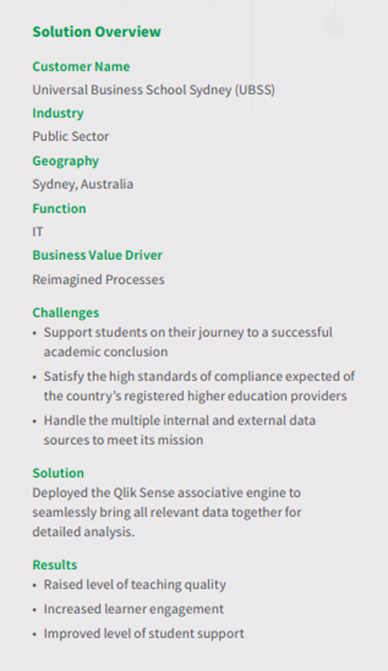
Customer story
“When COVID-19 struck, fortunately, we already had Qlik sitting in the middle of our systems, aggregating all of our data and monitoring things daily. Otherwise, we would have been in a bit of trouble, as many of our competitors were.”
Professor Andrew West, Dean of Universal Business School Sydney (UBSS)
Facing high educational standards 
There are two key imperatives facing Australia’s higher education
sector – one internal and one external. Internally, it is the goal of
supporting students on their journey to a successful academic
conclusion of their studies. Externally, it is satisfying the high
standards of compliance expected of the country’s registered
higher education providers which are set by the Tertiary Education
Quality and Standards Agency (TESQA).
One of Australia’s major independent higher education providers,
Universal Business School Sydney (UBSS), offering business degrees
at Bachelor’s and MBA (Master of Business Administration) level, has
deployed artificial intelligence (AI) and machine learning to meet
this double challenge. It has the seventh largest MBA student
enrolment in Australia. With a campus of more than 1,600 students,
UBSS must access multiple internal and external data sources to
meet its mission of providing a richer and deeper understanding of
the teaching and learning process, as well as enriching its
students’ experience.
Dean of UBSS, Andrew West, explains the complexity involved with
the six different academic management systems the organization
uses while interacting in real-time with the Department of Education,
Skills and Employment for academic data, the Department of Home
Affairs for visa and immigration data and the Department of Foreign
Affairs and Trade for international student intelligence.
“Although we were using the best platforms available, we found that no one academic management platform meets all our needs. So, we deployed the Qlik Sense data analytics platform. By the end of 2019 we were well on our way by using Qlik’s associative engine to seamlessly bring all relevant data together for detailed analysis. By making better sense of the data, we were making better, more informed decisions.”
Qlik helped maintain the edge during COVID-19
He recalls that because of the Qlik deployment with the help of Qlik partner, Impulse Analytics Pty Limited, UBSS was in a good position from the outset to make informed decisions about coping with the pandemic outbreak. Up to that point all UBSS students received 100% face-to-face learning on the Sydney campus. On Wednesday 18 March 2020, UBSS had to observe COVID-19 lockdown regulations and closed its doors. Exactly a week later UBSS was operating 100% online. Conscious of maintaining and continuing two-way communication with its staff and students, the UBSS IT team converted all the lecture rooms into studios and using tracking cameras it was able to replicate the lecture room experience.
West says: “Fortunately, we already had Qlik sitting in the middle of our systems, aggregating all of our data and monitoring things daily. We were able to use the data from Moodle, the student learning management system, to see the interaction of students with the curriculum, lecture times and assessment schedule. We were able to react very quickly to what was happening. Otherwise, we would have been in a bit of trouble, as many of our competitors were.”
He highlights the fact that instead of just being satisfied with online delivery, UBSS had moved to the next level. “We were able to analyze and achieve great insights to assist us in our decision making, not only on a daily basis where speed of decision making is critical, but also strategically for our longer-term cycle.”
Students and teachers enjoy faster information from wide range of sources
Qlik is deployed across several departments. “It is handling the whole student journey pretty well. From prospective student analysis, pre-admissions and admissions, academic departments, student support, and then on the top of that is IT and finance.”
West adds: “Rather than having this disparate series of Excel sheets and reports coming from all directions, our staff are benefiting from the speed with which the information comes through and have a better understanding and input into the way their reports come out and all fit together.”
“The result is greater speed of access, much higher quality data and improved information presentation. All of which makes the decision making a lot better. We also believe it has a positive impact on our students.”
UBSS’ student feedback about the online process has remained high and confirmed a consistent level of service and results. Student retention increased as did the completion rate of studies. The findings are reinforced by the federal government’s national Quality Indicators in Learning and Teaching (QILT) survey conducted every September. All 41 Australian universities must take part and 92 higher education providers entered in 2020, with around 280,000 students responding. “While the level of satisfaction of many of our competitors, particularly some major universities, dropped to 50% we recorded a level of more than 80%. UBSS also scored 20% above for the national average for the quality of learner engagement.”
Opportunities and challenges in the post-COVID era
Looking ahead, UBSS anticipates a blended campus once COVID passes, with some students staying online via its studio setup and others physically coming into the classroom. West pinpoints a key planning strategy for the future. “We want to do more with the predictive capability offered by Qlik. Using Qlik for data analytics and AI we can quickly ascertain the big picture trends, then easily drill down to the granular level to focus on the key drivers of academic quality and student support.”
UBSS is working and honing that aspect to inform and predict the future curriculum, assessment, course selection, learning design and student interface and support. West adds that through the use of machine learning UBSS will be able to apply predictive analytics for the resource allocation of courses, lecturers and student support. This also assists with future planning, sales and marketing trend analysis.
“I know our CFO is keen to harness the power of Qlik. For instance, in the first six weeks of any trimester we get a lot of daily figures as far as student enrolment, student subject selection, fees paid or not paid,” says West.
“Qlik helps, not so much with the calculation of it, but the distribution of that information so the reports are run overnight and are available on the dashboard the next day. We are looking to move and use Qlik to do more financial analysis.”
“We were able to analyze and achieve some great insights to assist us in our decision making, not only on a daily basis where speed of decision making is critical but also strategically for our longer-term cycle.”
Professor Andrew West, Dean of Universal Business School Sydney (UBSS)




